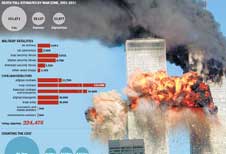'War on terror' set to surpass cost of Second World War

The total cost to America of its wars in Iraq and Afghanistan, plus the related military operations in Pakistan, is set to exceed $4 trillion – more than three times the sum so far authorised by Congress in the decade since the 9/11 attacks.
Click HERE to view graphic (101 kb)
This staggering sum emerges from a new study by academics at the Ivy-league Brown University that reveals the $1.3 trillion officially appropriated on Capitol Hill is the tip of a spending iceberg. If other Pentagon outlays, interest payments on money borrowed to finance the wars, and the $400bn estimated to have been spent on the domestic "war on terror", the total cost is already somewhere between $2.3 and $2.7 trillion.
And even though the wars are now winding down, add in future military spending and above all the cost of looking after veterans, disabled and otherwise and the total bill will be somewhere between $3.7 trillion and $4.4 trillion.
The report by Brown's Watson Institute for International Studies is not the first time such astronomical figures have been cited; a 2008 study co-authored by the Harvard economist Linda Bilmes and Joseph Stiglitz, a former Nobel economics laureate, reckoned the wars would end up costing over $3 trillion. The difference is that America's financial position has worsened considerably in the meantime, with a brutal recession and a federal budget deficit running at some $1.5 trillion annually, while healthcare and social security spending is set to soar as the population ages and the baby boomer generation enters retirement.
Unlike most of America's previous conflicts moreover, Iraq and Afghanistan have been financed almost entirely by borrowed money that sooner or later must be repaid.
The human misery is commensurate. The report concludes that in all, between 225,000 and 258,000 people have died as a result of the wars. Of that total, US soldiers killed on the battlefield represent a small fraction, some 6,100. The civilian death toll in Iraq is put at 125,000 (rather less than some other estimates) and at up to 14,000 in Afghanistan. For Pakistan, no reliable calculation can be made.
Even these figures however only scratch the surface of the suffering, in terms of people injured and maimed, or those who have died from malnutrition or lack of treatment. "When the fighting stops, the indirect dying continues," Neta Crawford, a co-director of the Brown study, said. Not least, the wars may have created some 7.8 million refugees, roughly equal to the population of Scotland and Wales.
What America achieved by such outlays is also more than questionable. Two brutal regimes, those of the Taliban and Saddam Hussein, have been overturned while al-Qa'ida, the terrorist group that carried out 9/11, by all accounts has been largely destroyed - but in neither Iraq nor Afghanistan is democracy exactly flourishing, while the biggest winner from the Iraq war has been America's arch-foe Iran.
Osama bin Laden and his henchmen probably spent the pittance of just $500,000 on organising the September 2001 attacks, which killed 3,000 people and directly cost the US economy an estimated $50bn to $100bn. In 2003, President George W Bush proclaimed that the Iraq war would cost $50bn to $60bn. Governments that go to war invariably underestimate the cost – but rarely on such an epic scale.
If the Brown study is correct, the wars that flowed from 9/11 will not only have been the longest in US history. At $4 trillion and counting, their combined cost is approaching that of the Second World War, put at some $4.1 trillion in today's prices by the Congressional Budget Office.
Join our commenting forum
Join thought-provoking conversations, follow other Independent readers and see their replies
0Comments